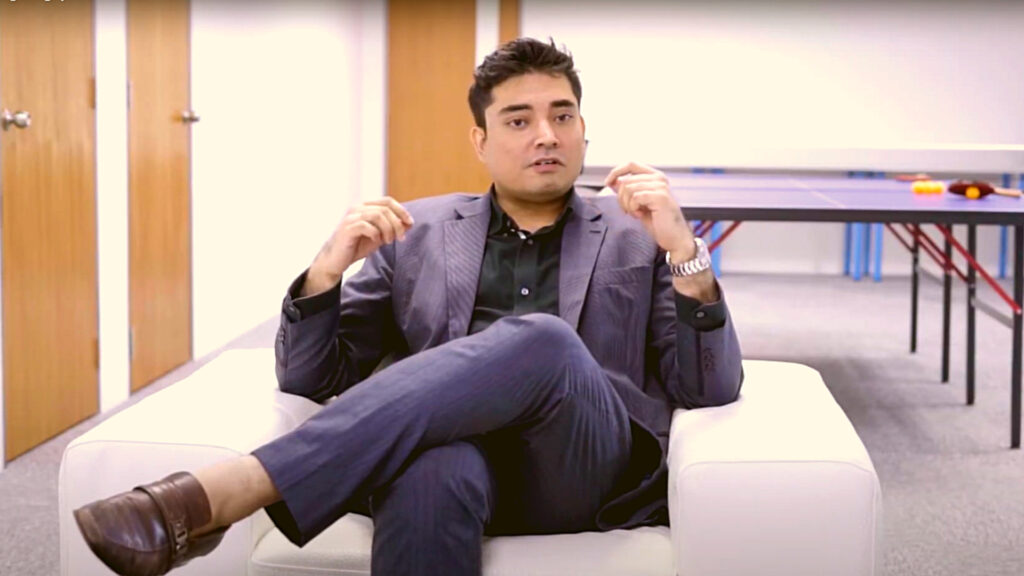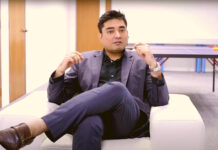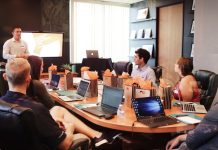Sancy Suraj, the CEO of Knowles Training Institute, The Umonics Method, and Pinnacle Minds, is no ordinary entrepreneur. With a world record in the Guinness World Records for the longest color sequence memorized and six Singapore Book of Records for his remarkable memory feats, Suraj is a memory athlete and trainer who has coached over 10,000 people worldwide. His unique approach to memory mastery has helped him to become a disruptive entrepreneur in the business world, using his expertise to integrate memory techniques into his entrepreneurial ventures to create a competitive advantage. In this interview, we will delve deeper into Suraj’s journey and learn about how he has successfully disrupted traditional business models, overcome challenges and misconceptions, identified new business opportunities, and adapted to the rapidly changing business landscape using his memory skills.

Can you tell us about your journey from being a memory athlete to becoming a disruptive entrepreneur in the business world?
My journey from being a memory athlete to becoming a disruptive entrepreneur in the business world has been an exciting and challenging one, marked by many highs and lows. It all started when I discovered my natural ability to memorize things at an early age. This led me to pursue memory training and eventually become a memory athlete, competing in memory championships around the world. Along the way, I set several world records and won many accolades, which helped me establish a name for myself in the memory world.
However, I soon realized that my skills in memory training could be put to use in other areas as well. That’s when I decided to leverage my expertise to create my own businesses. I founded Knowles Training Institute, The Umonics Method, and Pinnacle Minds, all of which offer training programs in memory enhancement, speed reading, and other related areas. By doing so, I was able to disrupt the traditional training industry, offering unique and effective methods to help people achieve their full potential.
As a disruptive entrepreneur, I have faced many challenges, including the need to constantly innovate and stay ahead of the competition. However, my background in memory training has helped me develop a unique perspective and approach to problem-solving. I am able to think creatively and come up with innovative solutions that set my businesses apart from others in the industry. Overall, my journey from being a memory athlete to a disruptive entrepreneur has been a challenging but rewarding one, and I am excited to see where it takes me next.
How do you apply your unique approach to memory mastery in your entrepreneurial ventures to disrupt traditional business models?
As someone with a background in memory training, I have a unique perspective that I apply to all of my entrepreneurial ventures. My approach to memory mastery involves breaking down complex information into smaller, more manageable chunks and associating those chunks with memorable images or concepts. I apply this same approach to my businesses, where I strive to simplify complex training topics and make them more engaging and memorable for my clients.
At Knowles Training Institute, we take a personalized approach to training, tailoring our programs to meet the specific needs of each client. By doing so, we are able to provide a more engaging and effective training experience that is designed to maximize learning and retention. Similarly, at The Umonics Method, we teach clients how to read faster and retain more information by using memory techniques such as visualization and association.
My unique approach to memory mastery has allowed me to disrupt traditional business models in several ways. For one, it has enabled me to provide more effective training programs that are designed to maximize learning and retention. By simplifying complex topics and making them more engaging, I am able to provide a more effective training experience that sets my businesses apart from others in the industry.
In addition, my background in memory training has also helped me develop innovative marketing strategies that have disrupted traditional business models. For example, I have used my memory skills to set world records and gain publicity, which has helped me attract more clients and establish a strong brand reputation. Overall, my approach to memory mastery has been a valuable asset in my entrepreneurial ventures, allowing me to disrupt traditional business models and provide more effective training programs that help people achieve their full potential.
What are some innovative ways you’ve integrated memory techniques into your business strategies to create a competitive advantage?
As someone with a background in memory training, I have found many innovative ways to integrate memory techniques into my business strategies to create a competitive advantage. One way that I have done this is by using mnemonic devices to help clients remember important information. For example, at Knowles Training Institute, we use a technique called the “memory palace” to help clients remember key concepts and ideas. By associating each concept with a specific location in a virtual “palace,” clients are able to remember the information more easily and recall it when they need it.
Another way that I have integrated memory techniques into my business strategies is by using visualization to create memorable marketing campaigns. For example, when promoting our training programs, we create visually engaging images and videos that are designed to stick in the viewer’s memory. This helps us stand out from our competitors and creates a lasting impression that can lead to increased business.
In addition, I have also used my memory skills to develop innovative networking strategies that have helped me grow my businesses. For example, I often use memory techniques to remember people’s names and important details about them, which has helped me build stronger relationships and create more opportunities for collaboration.
Overall, my integration of memory techniques into my business strategies has given me a competitive advantage in several ways. By simplifying complex information and making it more memorable, I am able to provide a more effective training experience that sets my businesses apart from others in the industry. In addition, by using visualization and mnemonic devices in my marketing and networking efforts, I am able to create a strong brand presence and build lasting relationships that lead to increased business.
“Integrating memory techniques into business strategies can provide a competitive advantage by simplifying complex information, creating memorable marketing campaigns, and building stronger relationships through effective networking.”
Can you share some examples of how your memory entrepreneurship has disrupted the status quo in your industry or market?
My memory entrepreneurship has disrupted the status quo in my industry and market in several ways. One example of this is my Guinness World Record for the longest color sequence memorized, which helped to put me on the map as a memory athlete and trainer. This record brought attention to the power of memory techniques and helped me establish a reputation as a leader in the industry.
Another example of how my memory entrepreneurship has disrupted the status quo is through my approach to training and coaching. At Knowles Training Institute and The Umonics Method, we use memory techniques to make training more engaging and effective. This has helped us to stand out from other training providers who rely on more traditional methods.
In addition, I have disrupted the status quo in my industry by using my memory skills to develop innovative marketing strategies. For example, I have used my ability to remember names and details to build strong relationships with clients and industry partners, which has helped to create more opportunities for collaboration and business growth.
Finally, I have disrupted the status quo in my industry by using memory techniques to improve my own productivity and performance. By using visualization and association techniques, I am able to stay focused and productive throughout the day, which has helped me to achieve more and grow my businesses at a faster rate than my competitors.
Overall, my memory entrepreneurship has disrupted the status quo in several ways, from setting world records to improving training methods and developing innovative marketing strategies. Through my approach to memory mastery, I have been able to stand out in a crowded market and establish a reputation as a leader and innovator in my industry.
What challenges or misconceptions have you faced as a memory entrepreneur, and how have you overcome them?
As a memory entrepreneur, I have faced several challenges and misconceptions throughout my journey. One challenge that I have faced is the misconception that memory techniques are only useful for memory competitions or for those with exceptional memory abilities. This misconception can sometimes make it difficult to convince potential clients of the value of memory training for improving everyday performance.
To overcome this challenge, I have focused on providing tangible examples of how memory techniques can be applied in real-world situations, such as in business, education, and personal life. By demonstrating the practical applications of memory techniques, I am able to show clients that these skills are not just for memory competitions, but can be used to improve their daily lives in a variety of ways.
Another challenge that I have faced as a memory entrepreneur is the perception that memory training is not a legitimate field of study or business. This misconception can make it difficult to gain credibility in the industry and can limit opportunities for growth and expansion.
To overcome this challenge, I have focused on establishing myself as a thought leader in the field of memory training by writing books and articles, giving talks and presentations, and participating in industry events. By sharing my expertise and knowledge with others, I have been able to gain credibility and build a strong reputation as a leader in the industry.
Finally, I have faced the challenge of competition in the memory training industry. With so many memory trainers and programs available, it can be difficult to stand out and attract new clients.
To overcome this challenge, I have focused on offering unique and innovative approaches to memory training, such as using virtual reality technology and developing customized training programs for specific industries and professions. By offering something different from my competitors, I am able to attract clients who are looking for a fresh and effective approach to memory training.
Overall, I have faced several challenges and misconceptions as a memory entrepreneur, but I have been able to overcome them by focusing on practical applications, establishing myself as a thought leader, and offering innovative approaches to memory training.
“Challenges and misconceptions can be tough obstacles to overcome, but with a focused mindset and innovative approach, they can be transformed into opportunities for growth and success.”
Suraj’s memory entrepreneurship has disrupted the status quo in his industry and market by integrating memory techniques into his business strategies. He believes that memory is a powerful tool that can be leveraged to identify and capitalize on new business opportunities that others may overlook.
Suraj has successfully applied his memory skills to think outside the box and come up with creative solutions to business problems that have given him an edge in the market. For example, he has used memory techniques to memorize clients’ names and important details, which has allowed him to develop better relationships with his clients, resulting in increased revenue and customer loyalty. As a memory disruptor, Suraj has faced challenges and misconceptions about the effectiveness of memory techniques in the business world. He has overcome these challenges by educating others about the power of memory and demonstrating its value through his successful business ventures.
Suraj’s entrepreneurial approach is guided by key principles and philosophies, such as constant learning, flexibility, and adaptability. He believes that these principles are essential for success in the rapidly changing business landscape, and he uses his memory expertise to stay ahead of the curve and adapt to new challenges.

How do you leverage your memory skills to identify and capitalize on new business opportunities that others may overlook?
As a memory entrepreneur, my ability to remember and recall information quickly and accurately has been a valuable asset in identifying and capitalizing on new business opportunities. One way that I leverage my memory skills is by constantly gathering and organizing information on my industry, market trends, and potential opportunities.
I use memory techniques such as the memory palace method to remember and categorize information in a way that allows me to quickly access it when needed. This allows me to stay up-to-date on industry news and to identify potential business opportunities that others may overlook.
Another way that I leverage my memory skills is by using them to build strong relationships with clients and partners. By remembering important details about their lives and interests, I am able to create a more personal connection with them and build trust and loyalty.
In addition, my memory skills also enable me to quickly recall important details from past business interactions, such as previous negotiations or agreements, which allows me to make more informed decisions and avoid repeating past mistakes.
Finally, my memory skills have also allowed me to quickly learn and adapt to new business environments and challenges. By using memory techniques to retain and process information more effectively, I am able to learn quickly and make informed decisions even in unfamiliar situations.
Overall, my memory skills have been a valuable asset in identifying and capitalizing on new business opportunities, building strong relationships with clients and partners, and quickly adapting to new challenges in the business world.
What are some specific ways in which your memory techniques have allowed you to think outside the box and come up with creative solutions to business problems?
My memory techniques have allowed me to think outside the box and come up with creative solutions to business problems in a variety of ways. One specific way that memory techniques have helped me is by allowing me to see patterns and connections between seemingly unrelated pieces of information.
For example, I may remember a conversation with a client about their personal interests or hobbies, and later connect that to a business opportunity that relates to their interests. This type of creative thinking allows me to come up with unique solutions that other entrepreneurs may overlook.
Another way that memory techniques have helped me to think creatively is by allowing me to visualize information in new and innovative ways. By using memory techniques such as the mind map or memory palace method, I can visualize complex information in a way that allows me to see connections and patterns that may not be immediately apparent.
Finally, my memory techniques have allowed me to approach problem-solving in a more systematic and organized way. By breaking down complex problems into smaller pieces and categorizing them in a memory palace, I am able to more easily identify potential solutions and test them out systematically.
Overall, my memory techniques have allowed me to think creatively and come up with unique solutions to business problems. By seeing connections between seemingly unrelated pieces of information, visualizing information in new ways, and approaching problem-solving in a more organized and systematic way, I am able to overcome challenges and disrupt traditional business models in innovative ways.
How do you use your memory expertise to stay ahead of the curve and adapt to the rapidly changing business landscape?
As a memory entrepreneur, my expertise in memory techniques has been essential in helping me stay ahead of the curve and adapt to the rapidly changing business landscape. I am constantly seeking out new information, ideas, and strategies to keep up with the latest developments in my industry, and I rely heavily on my memory techniques to retain and recall this information.
One way that I use my memory expertise to stay ahead of the curve is by constantly learning and experimenting with new memory techniques. I attend conferences and workshops on memory training, and I collaborate with other memory athletes and trainers to share knowledge and ideas. By staying up to date with the latest memory techniques and applying them to my own learning and work, I am able to continuously improve my memory skills and adapt to new challenges and opportunities.
Another way that I use my memory expertise to adapt to the rapidly changing business landscape is by using memory techniques to stay organized and productive. By using memory techniques such as the memory palace method or the mind map technique, I am able to manage my time more effectively, prioritize tasks, and break down complex projects into smaller, more manageable pieces. This allows me to stay focused and productive even in the face of changing priorities and shifting market conditions.
Finally, I use my memory expertise to develop innovative solutions to business problems and stay ahead of the competition. By using memory techniques to analyze data, spot trends, and identify patterns, I am able to generate new ideas and strategies that help me stay one step ahead of the competition. I also use my memory skills to create memorable and effective marketing campaigns, build strong relationships with clients and customers, and stay connected with my network of contacts in the industry.
Overall, my memory expertise has been a key factor in helping me stay ahead of the curve and adapt to the rapidly changing business landscape. By constantly learning and experimenting with new memory techniques, staying organized and productive, and developing innovative solutions to business problems, I am able to remain competitive and successful in my field.
What are some of the key principles or philosophies that guide your entrepreneurial approach as a memory disruptor in the business world?
As a memory disruptor in the business world, there are several key principles and philosophies that guide my entrepreneurial approach. These include a focus on continuous learning, innovation, and customer-centricity.
First and foremost, I believe in the importance of continuous learning. The world is constantly changing, and as an entrepreneur, it’s crucial to stay up to date with the latest trends, technologies, and strategies. This means investing in ongoing education and professional development, attending conferences and workshops, and collaborating with other industry experts. By continually learning and growing, I am able to adapt to new challenges and opportunities, and stay ahead of the curve in my field.
Innovation is another key principle that guides my entrepreneurial approach. As a memory disruptor, I am always looking for new and innovative ways to solve problems and meet the needs of my customers. This means thinking outside the box, taking risks, and experimenting with new ideas and strategies. I am constantly challenging myself to come up with new and creative solutions, and I encourage my team to do the same. By fostering a culture of innovation, we are able to stay ahead of the competition and deliver exceptional value to our customers.
Finally, I believe in the importance of customer-centricity. At the end of the day, our success as entrepreneurs depends on the satisfaction and loyalty of our customers. That’s why I always put the customer first, and strive to create products and services that truly meet their needs and exceed their expectations. I listen to their feedback, analyze their behavior and preferences, and use my memory skills to develop personalized, targeted marketing campaigns that resonate with them. By putting the customer at the center of everything we do, we are able to build lasting relationships and drive long-term success.
Overall, these key principles and philosophies guide my entrepreneurial approach as a memory disruptor in the business world. By focusing on continuous learning, innovation, and customer-centricity, I am able to stay ahead of the curve and deliver exceptional value to my customers.
What do you see as the future possibilities and potential of memory entrepreneurship in disrupting traditional business paradigms, and how do you plan to contribute to this movement?
As someone who has seen firsthand the incredible potential of memory entrepreneurship to disrupt traditional business models, I firmly believe that this movement has the power to transform industries and reshape the way we think about business. The ability to harness the full potential of our minds and leverage memory techniques to enhance our cognitive abilities and creativity is something that has enormous implications for the future of business and entrepreneurship.
In the years to come, I believe we will see memory entrepreneurship continue to gain momentum and become an increasingly important force in the business world. We will see more and more entrepreneurs leverage memory techniques to gain a competitive edge, identify new opportunities, and develop innovative solutions to complex problems. We will see businesses of all kinds embrace memory entrepreneurship as a means of staying ahead of the curve and adapting to a rapidly changing business landscape.
As for my own plans to contribute to this movement, I am committed to continuing to push the boundaries of what is possible with memory techniques and memory entrepreneurship. I will continue to train and mentor aspiring entrepreneurs and memory athletes around the world, sharing my expertise and helping others unlock their full potential. I will also continue to develop and refine my own entrepreneurial ventures, using memory techniques to drive innovation and disrupt traditional business models.
Ultimately, my goal is to help build a world where memory entrepreneurship is not just a niche movement, but a fundamental part of the way we think about business and entrepreneurship. I am excited to be a part of this movement, and I believe that the future possibilities and potential of memory entrepreneurship are truly limitless.
“The future of business belongs to those who are willing to harness the full power of their minds and embrace the transformative potential of memory entrepreneurship.”
Sancy Suraj’s memory entrepreneurship has disrupted traditional business paradigms and opened up new possibilities for the future of business. His success as a memory athlete and trainer has enabled him to integrate memory techniques into his business ventures, creating a competitive advantage and allowing him to identify new business opportunities. Despite facing challenges and misconceptions about the effectiveness of memory techniques in the business world, Suraj has remained committed to educating others about the power of memory and demonstrating its value through his successful business ventures. As the business landscape continues to evolve, Suraj plans to contribute to the memory entrepreneurship movement by constantly learning, staying flexible and adaptable, and using his memory expertise to stay ahead of the curve.










